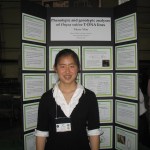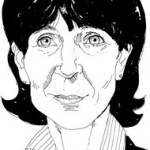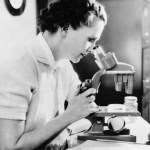women in science
As I ease myself back into the swing of things after a couple of weeks off and start to pay attention again to what's going on in the online world, I thought I'd bring this post to the attention of as wide an audience as possible.
It's The importance of language and framing, part eleventy-thousand by Amy Csizmar Dalal on her blog, This is what a computer scientist looks like.
Dalal draws a link between the decline in female CS enrollments since they peaked in the 1980s and the way we talk about entering the field in very competitive language rather than emphasizing mentoring or collaboration…
I wasn't going to raise this comment en blogge, but with Dr. Isis' new post, it becomes more relevant. From Rick Fletcher on the "you're too pretty" post:
It's a major issue if your department won't hire your or promote you because you are a woman. It's no surprise that a retail clerk at a small shop in a downtown area is not the smoothest operator.
25 years ago it was a common response when I was introduced as a PhD chemist: "You don't seem like a scientist." Now it's a common response when introduced, "Why are you single?" People say some dumb things. Not exactly the news.
But again, it's…
Merry Mou won first place in the Synopsys Silicon Valley Science and Technology Championship. 700 to 900 students participate with their research projects in a variety of categories, including physics, biology, and computer science. Winners are chosen to go on to state and national competitions.
Merry Mou won 1st place in Botany in the 2010 Championship for her project, Phenotypic and Genotypic Analyses of Oryza Sativa T-DNA Lines, which was completed in the summer of 2010 as part of the Young Scholars Program under the guidance of postdoctoral fellow Manoj Sharma. She will be participating…
Roxana Robinson, a fiction writer, recently described her writing process in an interview with the New York Times.
Writing a story, she said, is "incredibly exhilarating. . . . It's like doing a cliff dive, the kind that only works when the wave hits just right. You stand on top, poised and fearful, looking at what lies below: you must start your dive when the wave has withdrawn, and there's nothing beneath you but sand and stone. You take a deep breath and throw yourself over, hoping that, by the time you hit, the wave will be back, wild and churning, and full of boiling energy. It's kind…
Ta-Nehisi Coates at The Atlantic blogs: On Labor ("My son is the joy of my life. But the work of ushering him into the world nearly killed his mother.")
Scicurious at Neurotic Physiology: Dieting, Stress, and the Changing Brain.
Robert Reich's Blog at the Christian Science Monitor: US Chamber of Commerce: Obama makes a bargain
Jon R. Luoma at Yale Environment 360: Why Does Energy Efficiency's Promise Remain Unfulfilled?
Alice Bell at The Guardian's Notes & Theories blog: Sexual discrimination against women in science may be institutional -- and also one of the pieces she links to, Kathy…
The women science bloggers conversation is getting so long and elongated, I thought it would be interesting and, I hope, useful to put all the posts in rough chronological order. By rough I mean that I haven't attempted to order the posts within each day of publication. Perhaps I'll take another pass at the list later on for that.
The original list of posts is here.
2011.01.18. Woman science bloggers discuss pros and cons of online exposure
2011.01.22.Science Online 2011: Even when we want something, we need to hide it.
2011.01.22. Women science bloggers: Some thoughts (er, sorry, felt I…
Since the Perils of blogging as a woman under a real name panel at ScienceOnline 2011 there's been quite a bit of commentary floating around the science blogosphere about how women are represented within that community.
A kind of introduction:
The perils women sciencebloggers face are not that different than those we face in the real world... though the exposure of the internet can occasionally make it less safe. And the risks that women avoid out in the world, are not unlike those we avoid in the blogosphere. That was one of many important conclusions made in the panel Sheril Kirshenbaum,…
"Those who dwell, as scientists or laymen, amongst the beauties and mysteries of the earth are never alone or weary of life".
Rachel Carson, author of Silent Spring, 1962
"We live in a world which is penetrated through and through by science and which is both whole and real. We cannot turn it into a game by taking sides. . . . No one who has read a page by a good critic or a speculative scientist can ever again think that this barren choice of yes or no is all that the mind offers"
Jacob Bronowski, author of Science and Human Values, 1956
Here's another article we came across while editing material on the still-theoretical new website. Unfortunately, the article is more about the photographer than Anna Weizmann, herself.
Prof. Anna Weizmann was Chaim's younger sister, (there were a dozen brothers and sisters, all of them chemists, engineers and doctors). She was also one of the original 11 scientists (3 of whom were women) at what was then the Daniel Sieff Research Institute (est. 1934). She never married, (one article she co-authored referred to her as Miss Anna Weizmann) and she ran Dr. Chaim Weizmann's lab after his…
This year's Grace Hopper Celebration of Women in Computing took place this past week in Atlanta, GA.
I thought I'd gather together some small part of the blog posts I've been seeing floating around the Internets on this wonderful event.
Opening Session of Grace Hopper Conference - 2010
Dancing with Hundreds of Technical Women at Grace Hopper
The Impact of the Grace Hopper Celebration
It's the most wonderful time of the year
Back from GHC10@tlanta, now time to retrospect
Together, We Are Big Fish!
Grace Hopper Celebration 2010 : Day 2 (29 September)
Open Source Codeathon for Humanity (a…
Ed Yong recently published a post called "On the origin of science writers" asking that science writers (anyone who regularly writes about science) tell the story of how they got started. The idea is to establish a resource for future writers. I joined the thread and have reprinted it here.
As far back as I can remember I loved to read and I loved the wilderness. In fact my favorite times were reading in the wilderness, preferably in a tree near our mountain cabin, high enough where my brothers could not reach me with stones or snowballs.
I did not think much about being a writer myself until…
TThe Institute's Prof. Ruth Arnon was elected President of the Israel Academy of Sciences and the Humanities (IASH) last week - the first woman ever elected to the post. We spoke with her briefly:
You have held a number of leadership positions over the years. How is this one different?
My previous posts were mostly appointments; the president of the IASH is chosen by the entire body (of 100 elected members; 55 in the natural sciences and 45 in the humanities). I've served as vice president for the last six years. My name was brought forward by the search committee, but their recommendation…
In the midst of the ongoing conversation about managing career and housework and who knows what else (happening here, here, here, here, here, here, here, here, and likely some places I've missed), ScientistMother wondered about one of the blogospheric voices that wasn't taking an active role in the discussion. She mused in a comment at Isis's blog:
Do we ever get a post from DrugMonkey about how he does it? He has kids and a wife (who I think is a scientist) but he rarely talks about balance issues. I'm sure its been an issue. Until the MEN start talking about its not going to change.
When…
That all said, as a woman in science, it is sometimes disheartening to almost never hear an article suggest that a woman in science discuss household duties with her partner and split them evenly. The author of your article makes the statement that women bear the burden of household labor, but until scientists begin to tell other scientists that this isn't right, women are going to continue to leave academic science for fear of not being able to "balance" work and family.
You can be right and be practical at the same time. These need not be mutually exclusive. I also think that you need not…
Another day, another article about how women are biologically inferior to men when it comes to high-level math and science. The fact that this one comes from the New York Times Science section, a newspaper I typically respect very highly, is all the more tragic and frustrating. I don't have time today to write with as much depth and ferocity as I would like to, but I want to just say that I find it outrageous that the New York Times would publish something so obviously sexist and one-sided about such a complex, nuanced, and important topic under the headline "Daring to Discuss Women in…
The title of John Tierney's recent column in the New York Times, "Daring to Discuss Women's Potential in Science", suggests that Tierney thinks there's something dangerous about even raising the subject:
The House of Representatives has passed what I like to think of as Larry's Law. The official title of this legislation is "Fulfilling the potential of women in academic science and engineering," but nothing did more to empower its advocates than the controversy over a speech by Lawrence H. Summers when he was president of Harvard.
This proposed law, if passed by the Senate, would require the…
Today I wore a bikini for science.
Last week, Hojatoleslam Kazem Sedighi, Tehran's acting Friday prayer leader was quoted as saying :
"Many women who do not dress modestly ... lead young men astray, corrupt their chastity and spread adultery in society, which (consequently) increases earthquakes,"
Today, blogger Jen McCreight, is running a global experiment to test the hypothesis that not dressing modestly causes earthquakes.
"With the power of our scandalous bodies combined, we should surely produce an earthquake," she wrote.
Join in the experiment; bare an ankle or two.
A small selection from some tables of content from a few recent journals and proceedings. These will require subscription access to the ACM Digital Library.
Technical Symposium on Computer Science Education
Connecting k-16 curriculum & policy: making computer science engaging, accessible, and hospitable for underrepresented students by Joanna Goode
Computational thinking for the sciences: a three day workshop for high school science teachers by Sheikh Iqbal Ahamed, Dennis Brylow, et al.
Connecting across campus by Mark D. LeBlanc, Tom Armstrong, Michael B. Gousie
Teaching communication…
In recent days, there have been discussions of conditions for postdoctoral fellows, and about the ways that these conditions might make it challenging to tackle the problem of the "leaky pipeline" for women in science.
For example, in comments at DrugMonkey's blog, bsci opines:
Most people start a postdoc between the age of 25 and 30. Even in the academic world, a substantial portion of people are married by that age and a smaller, but non-trivial, proportion have children. How these people are supported on post-doc stipends is definitely an issue even in the first years of postdochood.
When…



